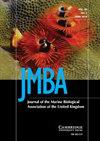整合遗传和生物物理方法来评估孤立岛屿系统的连通性:以具有重要文化意义的海洋腹足动物caputdraconis为例
IF 0.9
4区 生物学
Q3 MARINE & FRESHWATER BIOLOGY
Journal of the Marine Biological Association of the United Kingdom
Pub Date : 2023-07-18
DOI:10.1017/S0025315423000437
引用次数: 1
摘要
摘要种群连通性在集合种群动力学中具有重要作用,对种群在空间和时间上的持久性具有重要意义。海洋岛屿,如复活节岛(EI)和萨拉斯和戈麦斯岛(SG),是研究种群连通性的理想选择,因为它们相距415公里,与太平洋上的其他岛屿隔离超过2000公里。考虑到扩散过程可能对其种群的持久性起到关键作用,我们使用群体遗传学和生物物理模型评估了地方性腹足纲Monetaria caputdraconis在EI和SG之间的连接模式。11个微卫星位点在EI和SG个体的等位基因频率上没有显示差异,表明存在一个遗传群体。历史上的互惠移民表明,在EI中,0.49%的新兵来自SG,在SG中,0.37%来自EI。考虑到浮游生物全年释放幼虫和2周的幼虫发育,基于区域海洋模拟的拉格朗日实验表明,种群连通性较弱,自我补充率较高。有趣的是,自捕显示,返回幼虫的月和年际变化范围为1%至45%,与EI相比,SG的估计值更低。结果表明,很少有幼虫/个体到达彼此的岛屿,这可能是由于漂流等随机事件。总体而言,我们的研究结果表明,尽管距离遥远,但这两个岛屿仍保持着人口连通性;这些发现对设计该地区的保护策略具有启示意义。本文章由计算机程序翻译,如有差异,请以英文原文为准。
Integrating genetic and biophysical approaches to estimate connectivity in an isolated, insular system: case of the culturally important marine gastropod Monetaria caputdraconis
Abstract Population connectivity has a fundamental role in metapopulation dynamics with important implications for population persistence in space and time. Oceanic islands, such as Easter Island (EI) and the Salas & Gómez Island (SG), are ideal for the study of population connectivity because they are separated by 415 km and isolated from other islands in the Pacific Ocean by >2000 km. Considering that the dispersal process could play a critical role in the persistence of their populations, we evaluated the connectivity pattern of the endemic gastropod Monetaria caputdraconis between EI and SG using population genetics and biophysical modelling. Eleven microsatellite loci did not show differences in the allelic frequency of individuals located in EI and SG, suggesting the presence of one genetic population. Historical reciprocal migration implies that 0.49% of the recruits in EI come from SG and 0.37% in SG come from EI. Considering year-round larval release and a larval development of 2 weeks in the plankton, a Lagrangian experiment based on a regional oceanic simulation indicated a weak population connectivity with a high rate of self-recruitment. Interestingly, self-recruitment showed both monthly and interannual variation ranging from 1 to 45% of returned larvae, with lower values estimated in SG compared to EI. The results suggest that few larvae/individuals arrive at each other's island, possibly due to stochastic events, such as rafting. Overall, our results indicate that both islands maintain population connectivity despite their distance; these findings have implications for designing conservation strategies in this region.
求助全文
通过发布文献求助,成功后即可免费获取论文全文。
去求助
来源期刊
CiteScore
2.30
自引率
8.30%
发文量
68
审稿时长
3-8 weeks
期刊介绍:
JMBA is an international journal, publishing original research on all aspects of marine biology. It includes pioneering work taking place today on major issues concerning marine organisms and their environment. Subjects covered include: ecological surveys and population studies of marine communities; physiology and experimental biology; taxonomy, morphology and life history of marine animals and plants; and chemical and physical oceanographic work. Included with 2010 online subscriptions: Marine Biodiversity Records.

 求助内容:
求助内容: 应助结果提醒方式:
应助结果提醒方式:


